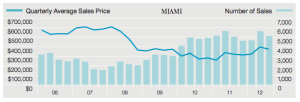Douglas Elliman’s 3Q market report dropped today, and Miami’s real estate market is entering an interesting phase. For one thing, mortgages aren’t easy to get, and banks aren’t helping much. So, cash still rules, and luckily due to international investors flocking to our shores, there’s tons of that. Oh, and inventory is waay down, and not because everyone’s snapping up condos like crazy. Sales activity has continued to rise, but not that much. Jonathan Miller, Curbed’s very own real estate guru-on-call, and the author of the Elliman Report, explains why, with some enlightening commentary on the topic.
Our Douglas Elliman report on Miami’s 3Q market was characterized by a sharp drop in inventory and distressed (foreclosures + short sales) sales, and a surge in sales of everything else. Cash still rules the market with a lot of help from international buyers. The number of active listings fell 24.7% and foreclosures saw a sharp decline in market share. (currently 18.6% from 44.2% in 1Q 2011).
Why did inventory drop so drastically?
1. There was an uptick in sales activity. (but not enough to justify drop) However, a lot of the shadow listings have been worked off over the past 2 years.
2. Sellers usually become buyers or renters, but due to low or negative equity, can’t if they can’t qualify to make the next purchase, so they wait.
3. The robo-signing scandal has kept foreclosure volume down. They will pick up soon, but probably not in a tsunami like in 2010 since the courts are backed up and banks discovered that short sales are more cost effective.
Non-distressed sales jumped year over year. Condos are up 33.9% and single family sales are up 17.1% without much help from banks. Cash purchases accounted for 72.8% of non-distressed condo sales and 76.3% of distressed condo sales. Not much of a difference. Part of the “cash” purchase phenomenon for condos has been the proliferation of international purchasers who continue to enter the market. The phenomenon is not simply a currency play caused by the weak US dollar but rather as a hard asset investment in a safe haven. Volatile financial markets, economic bubbles in South America, and trouble with the Euro have turned the investment focus on the coastal US in markets like Miami and New York.



